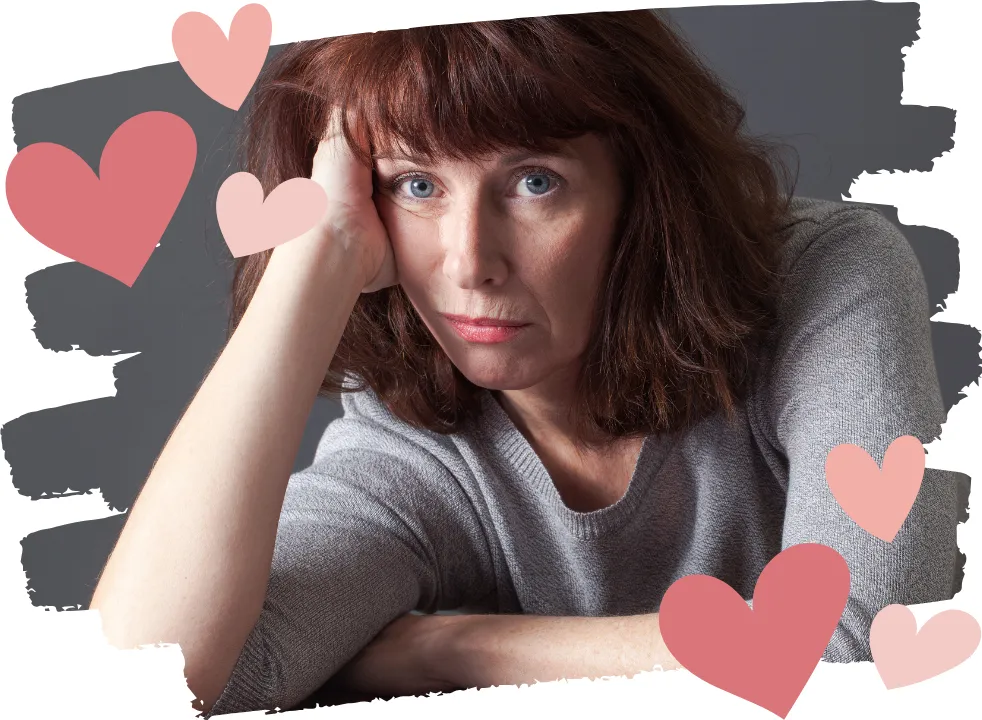The Blog
Physical Symptoms & Solutions
Welcome to the land of hot flashes, hair thinning, joint pain, bloating that makes you look six months pregnant—and yes, the stubborn weight gain that laughs in the face of your old diet tricks. This is where we break down the physical side of perimenopause with real solutions, hormone-savvy strategies, and a reminder that your body isn’t broken—it’s just asking for a new kind of care.

Is It Me or My Hormones? Emotional Numbness, Freak-Outs & the Midlife Mind
✨ Perimenopause Power Moves: 5 Simple Nutrition Shifts to Help You Feel Like Yourself Again ✨
Grab your free guide today!
👉 Download Now!
Is It Me or My Hormones? Emotional Numbness, Freak-Outs & the Midlife Mind
“My mission in life is not merely to survive, but to thrive; and to do so with some passion, some compassion, some humor, and some style.” ~ Maya Angelou
Let’s be real: perimenopause can mess with your emotions in ways no one warns you about. One minute you’re totally flat, watching a sad scene with zero tears. The next, you’re rage-crying because someone gave you the finger in traffic. (Rude, sir.)
Welcome to the emotional plot twist of midlife—where the spark can fizzle, joy feels out of reach, and you’re wondering, Is it me? Or is this just hormonal chaos?
Spoiler: It’s the hormones. But also? You’re not alone. And no, you’re not broken.
The Emotional Numbness Nobody Talks About
This isn’t your classic mood swing. It’s that weird, unsettling numbness—like your feelings are on airplane mode. A friend’s loss doesn’t register, but burnt dinner sends you spiraling. You want to care, but… you don’t. You want to feel joy, but sadness lingers instead.
This is more common than you think—and it's not a moral failing or lack of empathy. It’s your brain and hormones doing a messy midlife dance.
Estrogen: The Quiet Conductor of Your Feelings
Estrogen isn’t just about periods and hot flashes. It’s your brain’s behind-the-scenes BFF, regulating three major mood-related chemicals:
Serotonin (your “feel good” neurotransmitter): When estrogen drops, so does serotonin. Translation? Hello, sadness, irritability, and disinterest in things you used to love.
Dopamine (your motivation + reward chemical): Less estrogen = less drive, less joy, more “meh.”
Norepinephrine (your focus + stress responder): Estrogen helps keep it in check. Without it, you may swing between anxiety and emotional shutdown.
No wonder you’re weepy over spilled coffee and totally dead inside at the family BBQ.
The Freak-Out Factor: Why Small Things Hit Hard
Hormonal shifts lower your emotional threshold—especially when you're sleep-deprived (hello, 3 AM spiraling). That “tiny” trigger—burned toast, bad driver, forgotten birthday text—hits like a truck because your nervous system is already fried.
It’s not that you’re overreacting. It’s that your bandwidth is shot.
Mind-Body Mayhem: When Emotions Go Physical
Perimenopause doesn’t just mess with your mind—it hijacks your body too. Ever notice how gut issues, joint pain, or fatigue amplify your emotional struggle?
That’s the mind-body connection in action. When your body’s inflamed, overloaded, or exhausted, your brain can't regulate emotions the way it used to.
This is why yoga, breathwork, and gentle movement matter. Not for the Instagram aesthetic—but because they help calm your overworked nervous system and give your brain a moment to breathe.
Even 5 minutes of child’s pose or belly breathing can shift you from "why do I feel so disconnected?" to "okay, maybe I’m not totally unraveling."
So What Can You Actually Do?
Here’s what helps when your emotions are all over the place—or totally missing in action.
🧠 1. Know It’s Not All in Your Head
Hormones. Neurotransmitters. Fatigue. You’re not imagining it. And you’re definitely not alone.
💬 2. Talk to Someone Who Gets It
Therapists (especially those who specialize in women’s health) can help untangle the overwhelm. CBT and mindfulness-based therapies are especially effective.
🧘 3. Do Less, Feel More
Slow, mindful movement like yoga, stretching, or even walking can rewire your nervous system. Breathwork is free, powerful, and hormone-friendly.
🍳 4. Feed Your Brain
Protein, healthy fats, and fiber-rich foods stabilize blood sugar and support neurotransmitter production. (Burnt toast... not so much.)
👉 Need inspiration?
Grab my Protein Power Plates recipe guide—30 delicious, hormone-loving meals designed to help midlife women stay strong, steady, and satisfied.
Download it here and start fueling your focus—one tasty bite at a time.
🌿 5. Explore Natural and Hormonal Support
Magnesium glycinate. Saffron. B-complex. Or even bioidentical hormones if that’s right for you. Work with a practitioner who knows midlife women—your needs are not one-size-fits-all.
When to Reach Out for Help
If you’ve been stuck in emotional numbness or despair for weeks, please don’t brush it off. Red flags include:
Loss of interest in things you once loved
Changes in sleep or appetite
Feelings of hopelessness
Thoughts of self-harm
Seeking help isn’t weakness. It’s courage in action.
Your Brain’s in Flux—But You’re Still You
You’re not ungrateful. You’re not cold. You’re not “too sensitive.” You’re navigating one of the biggest hormonal transitions of your life—without a manual, and probably while managing a million other responsibilities.
There’s no shame in feeling numb. Or weepy. Or ragey. There’s only grace in acknowledging it—and strength in choosing to care for yourself anyway.
You are still in there. Even if you don’t feel like yourself right now. You are whole, worthy, and wildly capable of healing.
💌 Ready for Relief?
Grab my free guide:
✨ Tired of Hormonal Chaos? Take Back Control ✨
Packed with gentle, practical tips to stabilize your hormones, nourish your mind-body connection, and help you feel like you again.
Download it here – because you deserve more than just survival.
Hormonally Yours,
Kimberlee Erin
Just a heads-up: I’m a Certified Menopause Coaching Specialist and Holistic Nutritionist, and while I love sharing what’s worked for me and my clients, this blog is for informational purposes only. It’s not a substitute for medical advice. Always check in with your healthcare provider before starting new supplements, hormones, or treatments—especially since every woman’s perimenopause journey is different. You deserve personalized care that truly fits you.
Free Download
Embracing Perimenopause: Tips and Tools for a Smooth Transition
Feeling overwhelmed by perimenopause? You’re not alone. Get my free guide, "Embracing Perimenopause: Tips and Tools for a Smooth Transition," and gain the confidence to manage your symptoms effectively.
Packed with practical advice and expert tips, this guide will help you balance your hormones, reduce stress, and improve your well-being.
Download your copy today and start your journey towards a smoother, more empowered transition.

